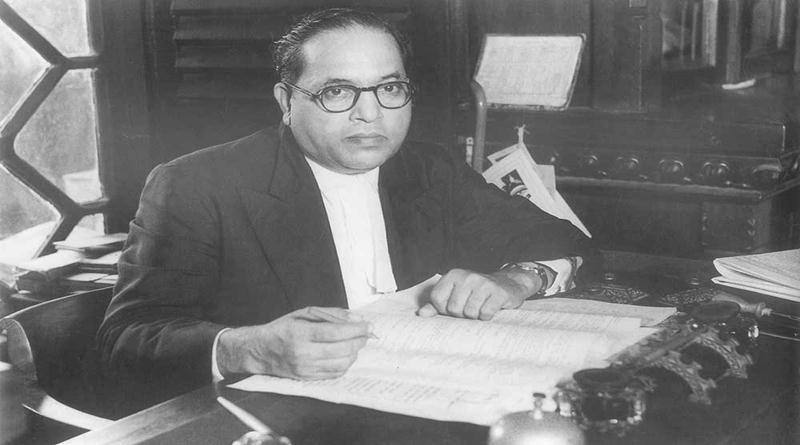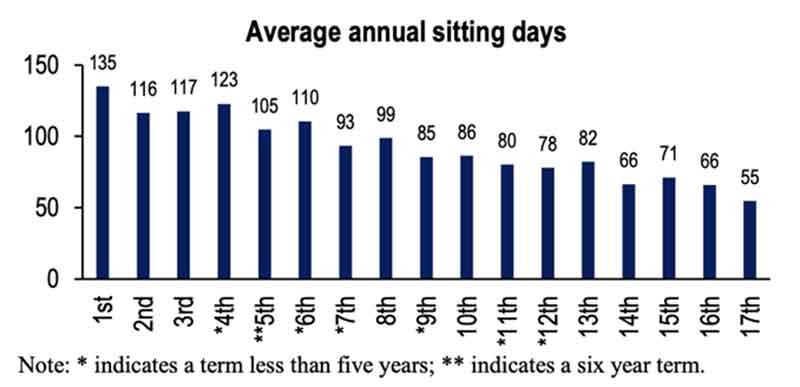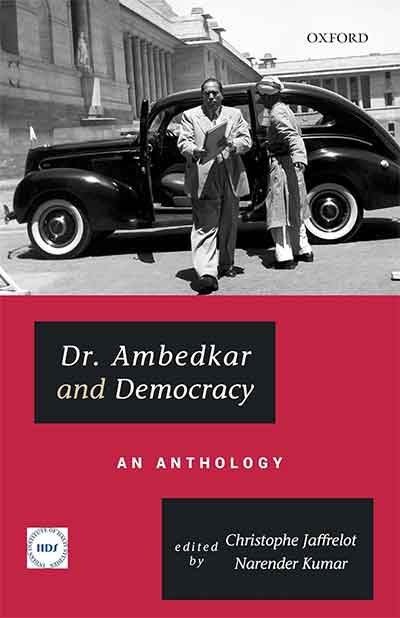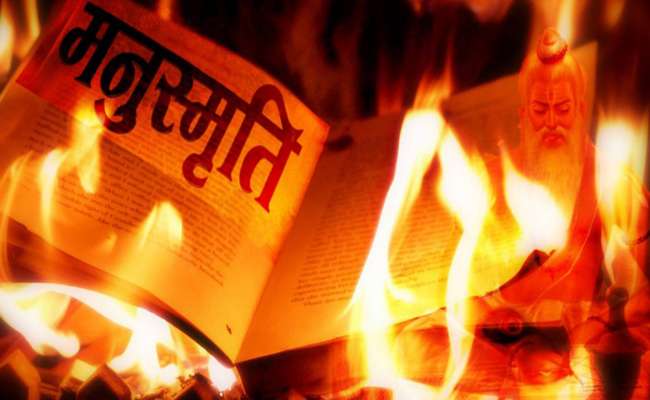
“There is a great need of someone with sufficient courage to tell Indians – beware of Parliamentary Democracy, it is not the best product, as it appeared to be”.
“Parliamentary Democracy is…in reality a government of a hereditary subject class by a hereditary ruling class”, said in 1943, Dr. BR Ambedkar, who is celebrated as a key founder of Indian democracy. It is merely a formal democracy founded on semi-feudal, and semi-colonial foundations, experience of decades tells us.
In this article, being published in three parts, marking Dr. BR Ambedkar’s birth anniversary (April 14), we went into the issue of Constitutional autocracy, among other things, in part-1, and his views on hereditary ruling classes, and hereditary ruled classes, is discussed in this part-2. This is a subject less discussed, in fact avoided by most of the scholars, including Ambedkarites, and leftists, but that is very relevant and needs to be discussed in present-day India, particularly in the context of the parliamentary elections, with phase-1 commencing on April 19.
Everyone now a days sees a vote-getter in Ambedkar, who is pictured as a father of India’s democracy.Decades after his death, a section of ruling classes remembered him, and said he was a Bharat Ratna. There is statecraft–cratfiness too–in what they did and still do to befool the masses. But it is much more than that, more than votes and vote-banks. They have larger goals: Even Modi claims the legacy of Ambedkar, like most political parties in India, though he was shunned by many of them for long.
The ruling classes and their parties are out to sustain, though in vain, the dubious democratic credentials of the system. Quite often they seek to invoke Ambedkar only to embellish and laud to the skies the so-called biggest democracy India has, which in fact is a Constitutional autocracy.
Indian democracy is anything but democratic for so many reasons, despite all such claims and vows, which we discussed in Part-1 of this article.
See Part-1 here:
India’s is a ‘constitutional autocracy’ : Hereditary ruling classes are inherent in India, said Ambedkar (17/04/2024)
Modi in his latest Newsweek(April 10, 2024) interview said:
“We are a democracy, not only because our Constitution says so, but also because it is in our genes. India is the mother of democracy...the largest democracy in the world, over 600 million people voted in the General Elections in 2019. In a few months from now, over 970 million eligible voters will exercise their franchise.”
“A democracy like India is able to move ahead and function only because there is a vibrant feedback mechanism. And our media plays an important role in this regard.”
https://www.narendramodi.in/prime-minister-narendra-modi-s-interview-to-newsweek-581292
Modi claims India under him has become a Viswa guru (world’s teacher), assumed great prestige in the world, and claims his place in the league of (western) democracies across the world. And that, a half-truth, is being pushed by the BJP and its servile media as part of their election campaign, as we see below.
*** ***
Modi’s “democratic allies” are skeptic about his claims of democracy
It appears a major section of his democratic allies are skeptic about his claims. Times of India, on Ambedkar’s birthday, Apr 14, 2024, featured a news story, from , with the following title:
“Western media questions Indian democracy in string of op-eds on Lok Sabha elections”
“ Opinion pieces on the Indian elections have been appearing thick and fast in the Western press…”
Modi’s India does not like that. But it must listen to its “democratic allies” as it fondly calls them. Times of India wrote:
“Western press op-eds dissect Indian elections, praising Modi’s post-independence leadership while critiquing his nationalist Hinduism and crackdown on opposition. Questions arise about India’s democratic future amidst predictions of BJP victory and Congress decline…”
The Times (London) ran a “leading article” which said: “Modi has cultivated the image of a strongman… thumbing his nose at Western liberals, and telling Indians their turn in the global spotlight has come.”
But “there is a darker side to his popularity,” the editorial continued. “Modi embraces ‘Hindutva”, playing up a nationalist Hinduism and discriminating against and passing laws that “disadvantage India’s large Muslim minority”.
It said Modi was “intolerant of the opposition”, referring to the arrest of Delhi CM Arvind Kejriwal, and claimed that “heavy pressure has been imposed on India’s once lively press to toe the government line,” including occasional harassment of the BBC.
The arrest of AAP ministers and freezing of Congress bank accounts have been frequently mentioned.
The Financial Times (FT) editorial board penned an article titled “The ‘mother of democracy’ is not in good shape”, saying: “PM Modi has repeatedly called India the ‘mother of democracy’. If so, an intensifying clampdown on opposition parties suggests this matriarch of representative government is in ill health. Harassment, often by tax or legal authorities, has become common for government critics… The BJP’s muscular Hindu nationalism has eroded India’s tradition of secular democracy.”
Bloomberg columnist Andy Mukherjee wrote: that the “more progressive and successful (southern) part of the country was drifting away from the poverty-ridden north” and its “majoritarian leader.” “A Hindu rashtra, or nation-state, will play well in the north. The very prospect of such an outcome fills the south with dread.”
All the op-eds predicted BJP would win the election and Congress faced a wipeout. The Economist published a list of books on Hindutva, telling its readers that non-Indians needed to understand the origins and core ideas of the “dangerous ideology”.
We know how governments (not merely media) of Germany, USA and UN too cast aspersions on Modi’s democracy by raising the issue of Kejriwal being arrested. India under Modi, who had openly campaigned for Trump in USA, objected to their “interference” in India’s internal affairs.
*** ***
Parliamentary democracy in India is more ornamental
Parliament has no deciding role on crucial matters, including on war and peace, demonetization, on farmers’ Bills, or their withdrawal.
A record number of 141 MPs were suspended by Modi’s parliament (NDTV, Dec 19,2023).
And the Nyay Samhita three Bills (CrPC new version) were passed, by voice vote, after keeping around 100 (97) MPs under suspension.
“ During 17th Loksabha, the majority Bills were passed without recorded voting.”
(PRS Research service)
See illustration given below how Modi era saw very few sittings compared to the past.
More than a dozen Bills were rushed on a single day, without a semblance of discussion. Ordinances are issued and re-issued to circumvent any hurdles. And Modi era tops the list.

Source: PRS Legislative Research.
Parliamentary democracy in India is ornamental, more so under Modi, the parliament being worse than a “talking shop”, as described by com TN in AP Assembly ( see his speech in the assembly, published in Countercurrents.org, 2016 july 28) while quitting it in 1969 March, T. Nagi Reddy was a veteran communist revolutionary who was a legislator four times. Data show that it is not even an active talking shop. Of course, it is occasionally reduced into wrestling House, Marshals doing the needful.
( see TN’s speech extracts here..https://countercurrents.org/2016/07/tarimela-nagi-reddy-remembered/)
During the term of the 17th LS, 35% of Bills were passed with less than an hour of discussion in Lok Sabha. The corresponding figure for Rajya Sabha was 34%. In 17th Loksabha, 729 Private members’ bills (PMBs) were introduced but only two were discussed.
None of such PMBs was passed by both houses since 1970 (PRS research).
While that is about Bills in the parliament, those passed by State-level legislatures are arbitrarily stalled, for years or even decades, by negating consent either by the Governor, an agent of the Union or by the President, i.e., the Centre itself, even when they are exclusively within the state list of the Constitution ( 7th Schedule). The office of the Governor, a dubious institution of the British colonial era, and the Governor’s powers, de jure and defacto, are both patently undemocratic.
Governors are a colonial institution since the era of Viceroys. They are ever stronger than before. BJP claims de-colonizing, but beefed up all such.
*** ***
“Parliamentary Democracy took no notice of economic inequalities…It did not mind if the freedom of contract gave the strong the opportunity to defraud the weak” – Ambedkar
The following views of Dr.Ambedkar are extracted from the speech he delivered at the concluding session of the All India Trade Union Workers Study Camp held in Delhi from 8th to 17th September 1943, under the auspices of the Indian Federation of Labour.
This historic document seems to have been lost sight of by many political pundits (all emphases added).
In his opening remarks Dr.Ambedkar says that “as the autocracy of Despotic Sovereigns was replaced, after a long and bloody struggle, by a system known as Parliamentary Democracy, it was felt that this was the last word in the frame of Government. It was believed to bring about the millennium in which every human being will have the right to liberty, property and pursuit of happiness. It is therefore a matter of surprise that there has been a revolt against Parliamentary Democracy although not even a century has elapsed since its universal acceptance and inauguration”.
He added: ” India is negotiating to have Parliamentary Democracy….There is a great need of someone with sufficient courage to tell Indians – beware of Parliamentary Democracy, it is not the best product, as it appeared to be”.
Dr.Ambedkar says, “I have no doubt that what has ruined Parliamentary democracy is the idea of freedom of Contract. Parliamentary Democracy took no notice of economic inequalities and did not care to examine the result of freedom of contract on the parties to the contract should they happen to be unequal. It did not mind if the freedom of contract gave the strong the opportunity to defraud the weak. The result is that Parliamentary Democracy in standing out as protoganist of liberty has continuously added to the economic wrongs of the poor, the downtrodden and the disinherited classes”
Thus, the poor growing poorer, and the rich becoming richer, is inherent in the political system itself.
This got accentuated under LPG (Liberalisation, Privatisation Globalization). These are the consequences of “freedom of contract”, the laissez faire system. Indeed to-day the world is awakening to the failures of the capitalistic system.
“Liberty swallowed equality and has left a progeny of inequities”
Dr.Ambedkar analyses the second cause in the following terms: “The second wrong ideology which has vitiated Parliamentary Democracy is the failure to realize that political democracy cannot succeed where there is no social and economic democracy”. He elaborates this phenomenon in the following terms: “Social and economic democracy are the tissues and the fibre of a Political Democracy. The tougher the tissue and the fibre, the greater the strength of the body. Democracy is another name for equality. Parliamentary Democracy developed a passion for liberty. It never made even a nodding acquaintance with equality. It failed to realize the significance of equality, and did not even endeavour to strike a balance between liberty and equality, with the result that liberty swallowed equality and has left a progeny of inequities “.
In this background, it would be most appropriate to recall the prophetic statement made by Dr.Ambedkar on 25th November 1949, while addressing the Constituent Assembly on the occasion of moving the Draft Constitution. He said – “On 26lh January 1950, we are going to enter a life of contradictions. In politics we will have equality and in social and economic life, we will have inequality.. we must remove this contradiction at the earliest possible moment or else those who suffer from inequality will blow up the structure and political Democracy which this Assembly has so laboriously built up”.
Hence the warning held out by him in 1943 itself, “Beware of Parliamentary Democracy, it is not the best product, as it appeared to be”.
“The class of ruled never becomes the Ruling Class”
Ambedkarites and others are fond of saying the oppressed communities should capture state power. But see what he stressed:
Dr.Ambedkar says: “All political societies get divided into two classes – the rulers and the ruled. This is an evil. If the evil stopped here, it would not matter much. But the unfortunate part of it is that the division becomes, stereotyped and stratified so much so that the Rulers are always drawn from the Ruling Class and the class of ruled never becomes the Ruling Class. People do not govern themselves; they establish a government and leave it to govern them, forgetting that it is not their government. That being the situation, Parliamentary Democracy has never been a government of the people or by the people and that is why it has never been a government for the people. Parliamentary Democracy, not withstanding the paraphernalia of a popular government, is in reality a government of a hereditary subject class by a hereditary ruling class. It is this vicious organization of political life which has made Parliamentary Democracy such a dismal failure. It is because of this that Parliamentary Democracy has not fulfilled the hope it held out to the common man of ensuring him liberty, property and pursuit of happiness”.
This critical analysis of Parliamentary Democracy expressed 80 Years ago, and even before India became independent and much before the promulgation of the Constitution of India, holds out a clear evidence that Dr.Ambedkar had envisioned what would transpire under Parliamentary Democracy in India, where “in politics we will have equality and in social and economic life, we will have inequality..”
How true his words are, is established by a perusal into what is happening under the umbrella of Parliamentary Democracy. Ambedkar not only identifies the class character of the Society but also acknowledges the Class Rule, and the exploitation of the Ruled Class by the Ruling Classes. All this reminds one of the Marxian analysis of State, which is characterized by Marx as an instrument of exploitation and Bourgeois Democracy as Bourgeois Dictatorship.
Ambedkar identified a new and added dimension to the Class Rule, when he says “Parliamentary Democracy .. is in reality a government of a hereditary subject class by a hereditary ruling class”. We have in India Political Houses very much like the Business Houses.
In Business, we hear of the House of Tatas, the House of Birlas, the House of Ambanis and the like and in politics, we have the Houses of Nehru – Gandhis, the Patnaiks, the Deve Goudas, the Scindhias, the Pawars, the Karunanidhis, the NTRs, the Abdullas and the like, ie, the hereditary Ruling Class. Parliamentary Democracy in India legitimizes hereditary rule of Political Houses.
Dr.Ambedkar poses the question “who is responsible for this?” and answers it without mincing words, thus: “There is no doubt that if Parliamentary Democracy has failed to benefit the poor, the labouring and the down-trodden classes. It is these classes, who are primarily responsible for it”. How true! The exploited classes have not realized that they are only formal “masters” in a Democracy but have been reduced to “subjects.” “ We the people..” in the Preamble is a deceptive contraption.
Why then did Ambedkar subscribe to this form of governance?
It looks paradoxical, but the only plausible explanation that can be given is that, after all he was the Chairman of the Drafting Committee, and he had no personal option, but to honestly reflect the wisdom of the Constituent Assembly, which after nearly three years of debates, had decided on this form of governance.
In the course of a debate in Rajya Sabha on September 2, 1953, Ambedkar himself said : “People always keep saying to me: ‘Oh, you are the maker of the Constitution’. “My answer is I was a hack. What I was asked to do, I did much against my will.” (Oxford Dictionary says ‘hack’ is ‘a person hired to do dull routine work.’)… But I am quite prepared to say that I shall be the first person to burn it out. I do not want it. It does not suit anybody.”
(see Countercurrents.org, 14 April, 2016)
This section, on hereditary ruling classes, is adapted from a paper presented at the XXXII Indian Social Science Congress held at New Delhi from 18′” December to 22nd December 2008.The paper by Dr K. S. SHARMA, of Karnataka, was titled as : “ROADLESS REPUBLIC” TO A REPUBLIC OF ENDS”. It is part of a book, Whither Indian republic? (2009). A version of it was published as an article, Ambedkar And Parliamentary Democracy, on 14 April, 2016, by Countercurrents.org.
See: https://countercurrents.org/sharma140416.htm)
Part-3 will discuss the hypocrisy of Modi and BJP which has political dynasties, its own and of its allies.
( Dr KS Sharma, born 1934, a Retired Professor of Law based at Hubli, Karnataka, has been a leader of working class for over 55 years now, still active, focused on unorganized labor. AS Founder- President of Karnataka State Govt. Dailywage Employees Federation, he successfully organized one lakh dailywagers of Govt of Karnataka who got regularized after 30 years of struggle that included street battles and legal battles going upto Supreme Court. The landmark case helped likewise over a million of them across India. He is a great teacher, poet, writer, dramatist, literary critic, columnist,publisher, orator, and an activist–social scientist who was a President of ISSA , Indian Social Science Academy, for sometime. He contributed articles to CC. He may be contacted at [email protected] and at [email protected]).
(Ramakrishnan is a political observer who contributed to countercurrents.org
*** ***















































